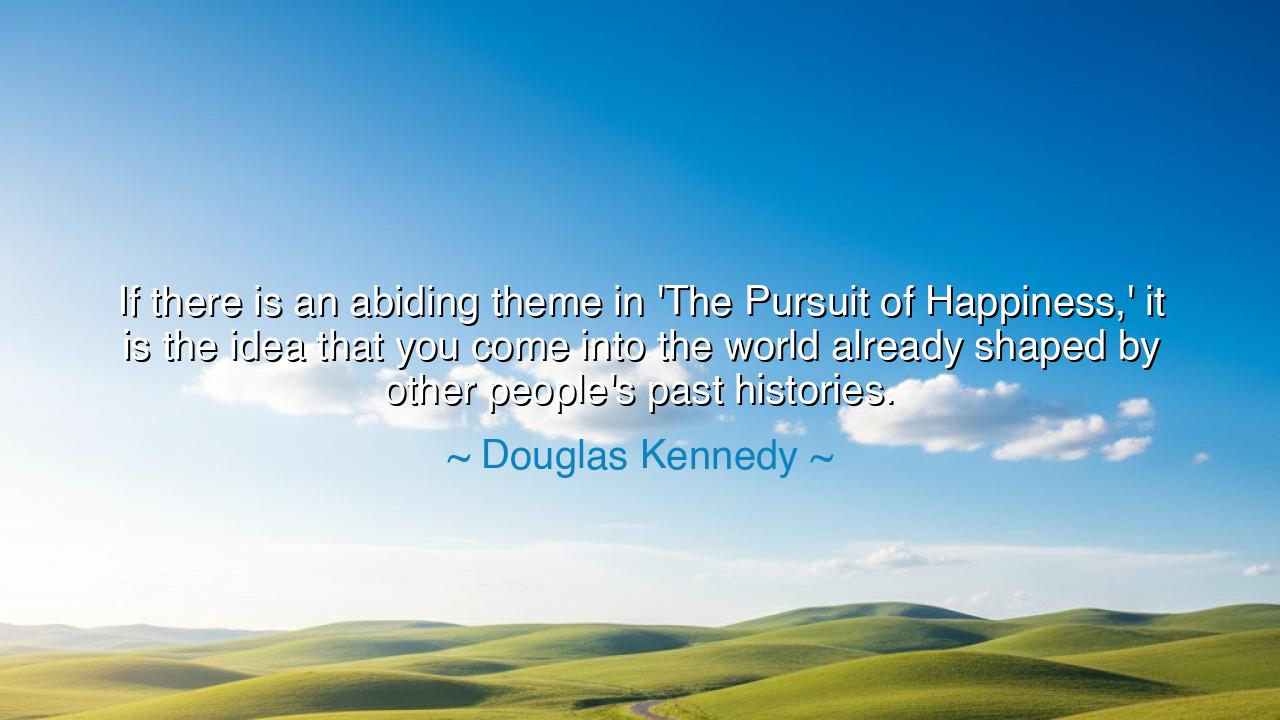
If there is an abiding theme in 'The Pursuit of Happiness,' it is
If there is an abiding theme in 'The Pursuit of Happiness,' it is the idea that you come into the world already shaped by other people's past histories.






The words of Douglas Kennedy, “If there is an abiding theme in ‘The Pursuit of Happiness,’ it is the idea that you come into the world already shaped by other people’s past histories,” strike the soul like a bell that has long been waiting to be rung. In this truth, ancient and unchanging, we are reminded that no life begins in isolation. Each of us is born not merely into the world, but into the story of the world—a story woven long before our first breath. The choices, dreams, and sorrows of those who came before us are threads in the fabric of our being. We are, in part, the echo of their triumphs, the consequence of their mistakes, the continuation of their love. Kennedy’s words remind us that inheritance is not only of blood, but of memory.
From the moment of birth, the invisible hand of history shapes us. The fears whispered by our parents, the values carried by our ancestors, the griefs they buried and the hopes they nurtured—all these lie within us, silent yet powerful. The ancient philosophers knew this truth well. The Greeks spoke of moira, the thread of fate spun by the gods, binding each man to the deeds of his forebears. The Hebrews told of the iniquities of the fathers visiting the sons, not as punishment, but as the unfolding of human consequence. And even in the East, the Buddha taught that we are caught in the wheel of karma, where the actions of generations ripple endlessly through time. We are not only ourselves—we are the continuation of those who came before.
Consider the story of Abraham Lincoln, born into poverty, the son of a quiet, illiterate man and a mother who died when he was a boy. Yet from that humble and sorrowful beginning came a heart filled with justice, forged in the fires of loss and endurance. The moral compass that guided Lincoln through the storm of civil war was not born in a vacuum—it was shaped by the struggles of his parents, by the faith of his frontier mother and the toil of his father’s labor. Even as he stood at the highest place in the nation, he carried within him the invisible weight of his ancestors’ histories, turning their suffering into compassion and their hardships into wisdom. Such is the alchemy of the human spirit.
But Kennedy’s insight is not meant to bind us helplessly to the past—it is to make us aware, so that we may transform what we inherit. For history is both a burden and a gift. The wounds of our predecessors can become our strength if we confront them, and their wisdom can become our compass if we honor it. To deny the influence of the past is to live blindly, but to understand it is to be free. The river cannot escape its source, yet it may choose the course it carves through the land. So it is with each of us: we are shaped, but not sealed; molded, but not imprisoned.
There are those who spend their lives wrestling with the shadows of those who came before—children of war who seek peace, children of silence who learn to speak, children of fear who choose courage. In them we see the power of transformation. They teach us that acknowledging our inheritance does not mean surrendering to it. Rather, it means recognizing the roots of our being so that we may tend them with wisdom. For only the tree that understands its roots can reach toward the sun without breaking.
This truth also calls us to responsibility. If we are shaped by the past, then our choices, too, will shape the future. Every word we speak, every act of kindness or cruelty, every truth we honor or betray becomes part of someone else’s beginning. To live wisely, then, is to live with the awareness that our lives ripple outward, touching unseen generations. The father who chooses patience, the mother who chooses hope, the friend who chooses forgiveness—all are sowing seeds that will bear fruit in lives they will never see.
So, my listener, take Douglas Kennedy’s wisdom to heart. Look behind you, not in regret, but in understanding. Seek the stories of your forebears—their joys and their wounds—and let them teach you. Heal what was broken; preserve what was noble. Then turn forward, and live so that your own story will be one that future generations may inherit with pride. For though we are shaped by other people’s past histories, it is within our power to shape the histories yet to come.
And when the day comes that your name is spoken by those who follow, may they find in your life not the shadow of pain, but the light of courage—a life that proves the truth of Kennedy’s words: that the pursuit of happiness is not only a quest for oneself, but the eternal work of mending the human story, one generation at a time.






AAdministratorAdministrator
Welcome, honored guests. Please leave a comment, we will respond soon